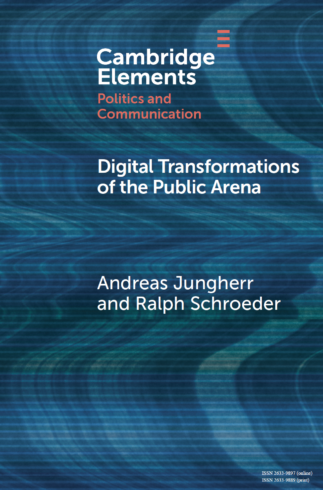The fifth lecture in the lecture series Digital Media in Politics and Society is online. It is available here and wherever you get your podcasts.
Link to script:
http://digitalmedia.andreasjungherr.de/docs/challenge/challenge_intro.html
All over the world, we see people using digital media to question and challenge authorities, organizations, norms and behaviors they perceive as dysfunctional or unjust. Digital media are therefore an important element in the challenge of established social institutions, sometimes even enabling these challenges in the first place.
Some of these challenges are aimed at expanding social representation and strengthening democratic participation. We find examples of this in the use of digital media by social movements, such as Black Lives Matter in the US. Other challenges aim to restrict representation and participation, as the example of the use of digital media by various right-wing populist movements and parties shows. Digital media can therefore contribute to strengthening societies and democracies as well as to weakening them.
In this chapter, we will discuss this role of digital media in politics and society in detail.
Chapters:
00:00 – Introduction
00:19 – Digital media and the challenge to institutions
01:23 – What are institutions and what do they do?
13:30 – Digital media as staging area for challenges to institutions
21:28 – Conclusion
In this episode, we will focus on the mechanisms through wich digital media allow challenges to social institutions.
Democracies depend on structures that connect governments, political elites, and the public. They facilitate information flows between different actors and different societal levels in democracies. Institutions like political parties, interest groups, and the news media make publics visible to elites, elites visible to publics, and publics visible to each other. They enable information flows making visible or allowing for the social construction of concerns, grievances, and interests of publics to elites and governments, while making elites and governments visible and – within bounds – transparent to the public. In this function, they provide, aggregate, and filter information.
These institutions find themselves increasingly challenged by digital media enabled actors. In this episode, we discuss the mechanisms behind these challenges.
Chapters:
00:00 – Introduction
00:20 – Intermediary institutions and the flow of information in democracies
09:52 – Lowered costs of information production, distribution, and access
14:50 – Lowered coordination costs
20:52 – Conclusion
In this episode, we will focus on digitally enabled challenges to political parties.
We see parties being challenged all over Western democracies. The analytical tools discussed above help us in charting and analyzing these challenges. These tools are:
– crisis and conflict in intermediary institutions, and
– emergence of new parties or factions within parties adapted to the new opportunities provided by lowered information and coordination costs.
In this episode, we will apply these tools to better understand the challenge to parties.
Chapters:
00:00 – Introduction
00:18 – Crisis, conflict, and the digital challenge to parties
00:49 – Signs of crisis and conflict of parties as institutions
07:49 – Challenge through information
14:02 – Challenge through coordination
19:47 – Conclusion
In this episode, we will focus on how digitally enabled challenges fail and how to assess their legitimacy and impact on democracy.
We have talked extensively about how digital media enable challenges to institutions. But of course this alone does not guarantee their success. Yes, digital media might help identify and document the weaknesses of institutions, their crises and conflicts. They might help challenges to form, being brought forward, and reach a broad public. But success of challenges is of course not determined by these opportunities alone. Instead, success relies on various context conditions and their specific structural embeddedness.
The other question, we repeatedly ran into was how to assess challenges. As we have seen, some challenges might be judged as strengthening democracy and empowering people, while others might achieve the opposite. Now, how can we as researchers adress this question? Without of course attributing the challenges we happen to sympathize with strengthening effects and those we dislike detrimental effects.
We will focus on these two questions in the final part of this episode.
Chapters:
00:00 – Introduction
00:19 – Challenges reexamined
01:25 – How challenges fail
07:00 – How to judge the legitimacy of challenges?
13:09 – Understanding the role of digital media in the challenge to institutions
17:27 – Conclusion
Link to podcast site:
https://tech-and-politics.letscast.fm
Link to YouTube Channel:
https://www.youtube.com/channel/UCNyEFI8ZU5LUC-04pNoTcOw/featured


